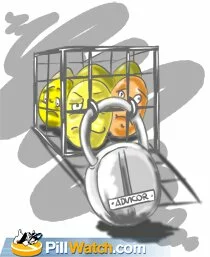
A human body, as well as his character, is a combination of good and bad. If negative traits of one’s character overwhelm the positive ones, a person is said to be bad and is usually denounced by the society. If the levels of wicked components of his body structure increase, a person is said to be ill, and thus he needs professional help.
Low-density lipoprotein or bad cholesterol is produced by our own bodies and is always present there; thus, it is naturally to suggest that we actually need it. However, if its level is significantly increased, it harms our body leading to the development of many dangerous health disorders.
One can fight high levels of bad cholesterol changing the diet or increasing exercising. For some people these measures work well and they manage to control their cholesterol level. Others, unfortunately, must seek medical help and reduce bad cholesterol using medications.
1. Advicor components
One of the drugs, commonly prescribed for cholesterol reduction, is Advicor – a combination of extended-release niacin and lovastatin. Both components of the drug are known to lower the level of total cholesterol, reduce low-density lipoprotein and triglycerides. On the other hand, the drug works beneficially for the amount of good cholesterol or high-density lipoprotein, increasing its level.
Though the precise mechanism of Advicor action in the human body is not yet understood by the scientists, it is often described in simple words as the ability of extended-release niacin and lovastatin to block up body’s capability to produce cholesterol. Anyway, Advicor interferes with body chemistry working in several directions and affecting lipids.
The treatment first results can be observed as soon as in 2 weeks, reaching their peak levels in 4-6 weeks of Advicor administration.
4. Side effects
The most common side effect of Advicor is flushing, which may occur within two hours of the first dose. Other frequent adverse reactions include constipation, gas, stomach pain, and cramps.
Rare side effects are headache, dizziness, itching, rash, allergy, muscle and joint pain, high blood sugar levels and blurred vision. Adverse reactions may vary from person to person depending on patient’s state of health and existing health conditions. The majority of side effects, however, are said to be mild and temporary.
5. Contraindications
Advicor may not be a good treatment option for some people. Contraindications include: allergy to any of the drug’s components, liver and kidney diseases, arterial bleeding, diabetes and ulcers.
People younger than 30 are usually not recommended to take cholesterol-lowering drugs; the possibility and anticipated benefits must be evaluated by a professional health-care provider.
Pregnant and breastfeeding women should never use Advicor, since plenty of cholesterol is necessary for the normal fetus development. In addition, the drug’s active ingredients pass into the breast milk and may harm a baby.
6. Drug interaction
Advicor should not be mixed with alcohol, grapefruit juice, red yeast rice, any herbal remedies and food supplements.
Use of multiple other medications can alter the action of Advicor, and thus cause worsening of side effects or minimizing the results. Some medicines, which should not be taken along with Advicor, are:
- cardiovascular medications, such as blood pressure drugs (atenolol, metoprolol tartrate, and propranolol hydrochloride) and antianginal drugs (nitroglycerin);
- antifungal drugs (itraconazole and ketoconazole);
- calcium channel blockers (amlodipine besylate, felodipine, and nifedipine);
- gastrointestinal medications (cimetidine);
- antibiotics (Clarithromycin, erythromycin);
- antidepressants (Nefazodone);
- immunosuppressants (Cyclosporine);
- diuretics and anticoagulants;
- other cholesterol-lowering drugs.
Many other pharmaceutical drugs can interact with Advicor, so a patient must be sure to tell a doctor about any medicines he is currently taking.

7. Dosage and use
Advicor is recommended to be taken at bed-time with a low-fat snack. The pills should be swallowed whole by mouth.
The initial dose is one tablet containing 500 mg of niacin and 20 mg of lovastatin. If the treatment proves to be ineffective in four weeks, the dose can be increased by 500 mg of niacin every four weeks. Doses of more than 2000 mg of niacin and 40 mg of lovastatin are not recommended.
Though Advicor is a good support in fighting bad cholesterol, it is still a stranger for the human body. Hopefully, more patients will control their lipids with the help of dieting and exercising alone, and less people will need pharmaceutical weapon to suppress the bad components of their bodies.
| Tip for you : Sign-in with Your OpenID and post faster, easier and with easy access to all your past posts. | |
|
Your Nick: |
















